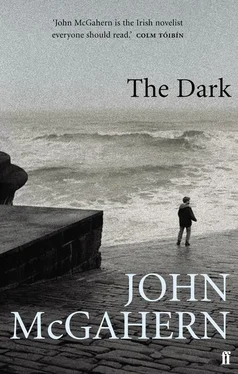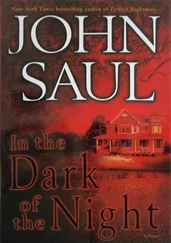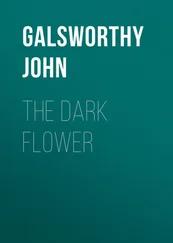John McGahern - The Dark
Здесь есть возможность читать онлайн «John McGahern - The Dark» весь текст электронной книги совершенно бесплатно (целиком полную версию без сокращений). В некоторых случаях можно слушать аудио, скачать через торрент в формате fb2 и присутствует краткое содержание. Год выпуска: 2002, Издательство: Penguin Books, Жанр: Современная проза, на английском языке. Описание произведения, (предисловие) а так же отзывы посетителей доступны на портале библиотеки ЛибКат.
- Название:The Dark
- Автор:
- Издательство:Penguin Books
- Жанр:
- Год:2002
- ISBN:нет данных
- Рейтинг книги:5 / 5. Голосов: 1
-
Избранное:Добавить в избранное
- Отзывы:
-
Ваша оценка:
- 100
- 1
- 2
- 3
- 4
- 5
The Dark: краткое содержание, описание и аннотация
Предлагаем к чтению аннотацию, описание, краткое содержание или предисловие (зависит от того, что написал сам автор книги «The Dark»). Если вы не нашли необходимую информацию о книге — напишите в комментариях, мы постараемся отыскать её.
The Dark — читать онлайн бесплатно полную книгу (весь текст) целиком
Ниже представлен текст книги, разбитый по страницам. Система сохранения места последней прочитанной страницы, позволяет с удобством читать онлайн бесплатно книгу «The Dark», без необходимости каждый раз заново искать на чём Вы остановились. Поставьте закладку, и сможете в любой момент перейти на страницу, на которой закончили чтение.
Интервал:
Закладка:
You were given a meal in the restaurant downstairs, a Yale key, and you went outside, by the green railings of Eyre Square. You’d a place to stay. You’d money from the Scholarship. You were free. Woolworth’s across the Square was the same as the place in Sligo. A girl with a red scarf walked ahead, you started to follow, fascination of her shape as she moved, the cane shopping-basket swinging at her thigh. One day, one day, one day, you’d have a girl of your own, a world of marvel then. But now the University, one dream that would come to earth this day.
You went, asking when you weren’t sure, across the Corrib, two swans against withering October reeds in the distance, stone buttresses alone in the water, remnants of a railway that crossed the river to Clifden once. You didn’t think. You were excited. You had the University to see.
Then you saw it through the trees past the boathouse. A castle, old stone, and towers, green copper domes.
Seat of learning, the gravity of days, eternal evenings, centre where you’d travel into joys and secrets shut away. The phrases of rhetoric rose the same as prayers. All the nights of sweat had meaning now. And why did it cause this rhetorical reverence or was there anything except the images and these inconsequential phrases.
But it was hard to walk slow. Wrought iron gates with a broken gas-lamp on the pier top. The stone lodge and the chrysanthemums in the beds. A drive of tarmacadam ran past the front of the main building, rows of old chestnuts bordered the football pitch and tennis courts, raw colour of a stack of timber beyond the courts.
It seemed strange to have come, to be standing there on tarmacadam, and looking on, the images. How much of your life would pass here? You might never even leave. A brilliant course of studies, chosen to teach, a gowned professor under the chestnuts. The roots thick as any tree of the Virginia creeper rose to spread and flower red on the stone. The great door with iron bands was open. Notices and letters were tacked on the green boards behind glass. Nobody from your house had ever reached a University before.
Groups stood about. You fell into conversation with a student from Donegal. That night you arranged to go with him to the Savoy. At eight around Moon’s Corner he’d meet you.
Afterwards you wandered about the town, you made sure where Moon’s Corner and the Savoy was. The bustle of the street seemed to rush as water in a tidal movement, and it was strange to try to understand that you were alive and standing in these busy streets. Outside the Skeffington Arms a boy was crying the evening newspapers. By the Claddagh through the Spanish Arch and out on the Long Walk to the sea, Galway Bay. The Dun Aongus was waiting to Aran, a trawler from Rotterdam, the sailors washing its deck with hoses, and the black-headed gulls drifting overhead. Your feet started to tire, you’d walked too much without noticing. The eyes roved, resting for moments on odd objects. Broken fish-boxes and wild grass and the sea, and was it all no more than a catalogue. A sudden flash on the memory, singing of “Galway Bay” under the town clock in Carrick a night after pub close, the drunken voices out of time: and here was where you’d go to the University. You were only hours here yet, and it was not easy to keep hold of the dream, wild grass and sea and broken fish-boxes same as anywhere, this was the University town, but it was more solid concrete and shapes and names with the sea and sky and loneliness than any dream, but at eight you would meet John O’Donnell at Moon’s Corner, it was something to look forward to, it would break the obsession that there was never possibility of possession or realization, only the confusion of all these scattered images.
O’Donnell was already waiting when you reached the corner at eight. A shower had started, the streets black and greasy, reflecting the lamps. O’Donnell said he’d looked up the papers, and that there was a terrific cowboy in the Savoy. He’d seen it before in Dublin but wanted to see it again, and immediately you fell into step, it was marvellous to be going with someone to any picture. You got the cheapest seats, close to the screen, each of you paying for his own. A short, “Jingle Tunes” was running when you entered the dark, people were singing, and O’Donnell was hardly in his seat when he joined them.
On top of Old Smokey
All covered with snow, ( everyone together )
I lost my true lover
Came a courtin’ too slow .
O’Donnell was singing, without any self-consciousness in the world. You couldn’t. People were all about. You wished you could join too but it was no use, would it be same as this always, but it was still wonderful to be just there. This was life.
“Come on. Sing up. We used go crazy over this in the Royal in Dublin with Tommy Dando.”
“I can’t. I’m not used.”
And then with relief the cowboy was running, there was silence, the cinema was lost in what was happening on the one screen. There was a feeling of being set free to share in all this running and excitement, the strong righteous man and the noble woman against the hirelings. Out on the wet street afterwards there were several heroes with gun hand crooked and unflinching walk ready to shoot their way through to the world.
“What did you think?” O’Donnell asked.
“It was great,” you managed to say out of the choking after effect of the emotion, all pictures were marvellous, you hadn’t seen enough to compare, people who said one was good and another bad had some secret knowledge.
“It was smashing. Do you want to head home or would you like a cup of coffee?”
“I don’t mind, whatever you’d like.”
“We’ll have a cup.”
You paid when the waitress brought the cups, everything was plastic, the cups and spoons to the green table-top.
“Used you go to the pictures much?” you asked once the cups were stirred.
“In Dublin, always on Sunday afternoon, and other times if there was a girl and any money. That’s when we were in the Albert College.”
“Where used you get the girls?” you were fearful of betray¬ ing your ignorance, the trembling curiosity.
“At the dances. Every Sunday night we were in Conarchy’s. Always more women than men. They say Dublin is the best place in the world for women.”
“What kind were the women?”
“Fine things. Nurses, and girls from Cathal Brugha. They used to live in a hostel in Mountjoy Square. Schweppes Lane was a great place beside the hostel, full of couples after Conarchy’s.”
Over the coffee-cups a pain of jealousy. Schweppes Lane crowded with couples, kissing and touching in the lane’s darkness, where did they put hands, or did they strip clothes against the wall. O’Donnell had been there against the soft flesh of a girl out of Conarchy’s, and you hadn’t, that much pleasure escaped from your life for ever.
“Have you any girl?” O’Donnell asked.
“No. I can’t dance,” you said, though for a moment you were tempted to lie.
“No one can dance. They just shuffle round. It’s a place to pick up girls. If you watch for a dance or two you get the hang of it. Why not come to the Jib’s Dance Thursday night? After that we could hit out to Seapoint.”
The Jib’s Dance was in the Aula Maxima. The coloured poster in the archway had displayed a cloddish couple dancing.
“Do you think would I be able?”
“Of course,” O’Donnell laughed.
The café was closing. At Moon’s Corner you parted. O’Donnell had to cross the river past the University. It was still raining. Eyre Square was lit more with neon than the lamps. You began to touch the wet iron railings with your fingers for no reason as you walked, listened to your feet go on the pavement. You wished you could have walked with O’Donnell, even though you’d have to come back across the sleeping town on your own, and you wished you could find someone to talk any rubbish with when you reached Prospect Hill, anything to avoid the four walls of the room and the electric light on the bed, but it was too late, you had to climb on the stairs creaking under your feet on the bare brown linoleum. When you switched on the light you shivered to see the cream coverlet flood bare with light. You had come to the University, you’d sleep your first night in the town. You thought of Mahoney in another bed in the same night, and that you’d promised to write, it’d pass some of the time, it’d be something to do now.
Читать дальшеИнтервал:
Закладка:
Похожие книги на «The Dark»
Представляем Вашему вниманию похожие книги на «The Dark» списком для выбора. Мы отобрали схожую по названию и смыслу литературу в надежде предоставить читателям больше вариантов отыскать новые, интересные, ещё непрочитанные произведения.
Обсуждение, отзывы о книге «The Dark» и просто собственные мнения читателей. Оставьте ваши комментарии, напишите, что Вы думаете о произведении, его смысле или главных героях. Укажите что конкретно понравилось, а что нет, и почему Вы так считаете.












